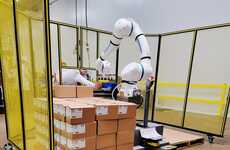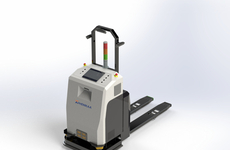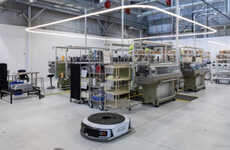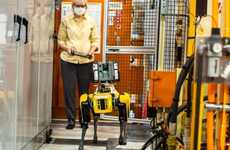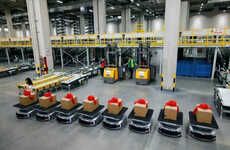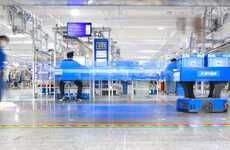
Foxconn is Replacing a Large Amount of its Assembly Workers with Robots
References: foxconn & digitaltrends
Foxconn is a Chinese tech factory that has recently replaced a grand portion of its factory employees and assembly line technicians with robotic counterparts. The brand puts together many of Apple's products, and now the company will do so in the majority without human touch.
To date Foxconn has replaced 110,00 of its former workers with machines able to carry out the same tasks, leaving its factories with no more than 50,000 employees in total. The switch alludes to the company's intention to save on profits by reducing costs human workers require -- such as benefits, wage increases and vacation pay. While the machines are more costly initially, the brand hopes to increase profits and efficiency overall with less workers to pay and support over time.
To date Foxconn has replaced 110,00 of its former workers with machines able to carry out the same tasks, leaving its factories with no more than 50,000 employees in total. The switch alludes to the company's intention to save on profits by reducing costs human workers require -- such as benefits, wage increases and vacation pay. While the machines are more costly initially, the brand hopes to increase profits and efficiency overall with less workers to pay and support over time.
Trend Themes
1. Robotic Factory Workers - The rise of robotic factory workers is disrupting traditional manufacturing industries by increasing efficiency and decreasing labor costs.
2. Automated Assembly Lines - The adoption of automated assembly lines is providing a possible solution for workforce shortages in the manufacturing industry.
3. AI-powered Manufacturing - Integrating AI into manufacturing processes can provide real-time insights to increase productivity and reduce downtime.
Industry Implications
1. Manufacturing - Manufacturing industries are experiencing a shift toward the use of robotics and automation, decreasing the need for human labor and reducing costs.
2. Technology - The development and implementation of robotic technology is providing new opportunities for technological advancements in the manufacturing industry.
3. Logistics - The adoption of robotic and automated systems in manufacturing is creating opportunities for logistics industries to integrate similar technology to optimize supply chain operations.
1.1
Score
Popularity
Activity
Freshness


